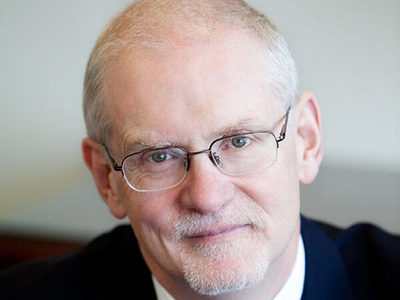Our People Feature: Paul Booth, Research Fellow

You would think that after a brilliant career serving in deputy ministerial positions provincially and federally, working as a G7 deputy, teaching at the university level and helping to establish the Trillium Network for Advanced Manufacturing – all of it capped off by an Order of Canada award – Paul Boothe would be ready to enjoy a well-earned retirement.
Not a chance. Boothe is just warming up in his position as a research fellow at the University of Calgary’s School of Public Policy. His forthcoming project will involve examining the findings of the Alberta government’s MacKinnon committee on the province’s finances.
“My interest for the School is fiscal policy. I’m interested in budgeting, debts and deficits, intergovernmental relations and fiscal transfers,” Boothe says. With the expertise of economists like Jack Mintz and Bev Dahlby, to name just two, Boothe says the University of Calgary is one of the strongest places for him to pursue his interests.
Taking on the SPP fellowship means he’ll be stepping back from his role as managing director at Trillium to work only part-time with the government-funded non-profit that he co-founded. Based in Ontario, Trillium’s mandate is to promote the growth of manufacturing in that province. His work with Trillium began while he was still director of the Lawrence National Centre for Policy and Management at Western University’s Richard Ivey Business School. He retired from that position three years ago, but he also previously taught for a number of years in the University of Alberta’s economics department
Boothe’s focus at Trillium has been examining the experience of firms that were early adopters of digital manufacturing technology.
“Trillium is on the practical side; we spend a lot of time visiting firms and talking to senior leaders. We’re interested in the strategy and lessons they’re learning. Last year, our big project was looking at how successful firms have entered international markets. Everyone says we have to grow our exports; the practical reality of doing it is really complex,” Boothe says.
“People say you should start exporting because that’ll make a great firm. That causality is backwards. You’d better be a pretty strong firm with a clear strategy before you export, otherwise you can waste a lot of time and money and not make much progress. The firms that are ultimately successful have learned a lot along the way. It’s been interesting for someone who has spent his career as a professor; you don’t get exposed to the practical side of things.”
That may be quite a modest assessment of Boothe’s experience. He certainly had an in-depth working relationship with all things practical during his years in government.
“When I was in the department of finance in Saskatchewan, we balanced the budget and got three credit rating upgrades. It was a very strong financial time for Saskatchewan. In Ottawa, I led the negotiations on the restructuring of GM and Chrysler. It was a big file, with big numbers. I worked closely with (former prime minister Stephen) Harper and senior members of government,” Boothe says.
Serving as a G7 deputy when Paul Martin was prime minister proved to be one of his most exciting projects. “That was the year the U.K. was head of the G7 and the focus was debt relief for Africa. There was a US$50 billion debt relief project that the G7 countries had to agree on. There were lots of negotiations around that,” he says.
Despite all these big-ticket items, Boothe hasn’t lost sight of the difference that smaller projects can make. At Trillium, he’s been instrumental in helping the organization go green in its office and its travels.
“We measured the cost of running our office (heating and electricity). Using our bills from the past year, we calculated that we used 1,800 cubic metres of natural gas and 2,400 kilowatt-hours of electricity. Using the carbon calculator at zerofootprintcarbon.com, we determined that the carbon cost of running our office was 3.7 tonnes.”
Next up for scrutiny were transportation emissions. “We use planes, trains and automobiles to do our work. Looking at our expense claims for the past year and using the carbon calculator, we determined that our flights produced 0.83 tonnes of carbon, train trips produced 0.09 tonnes and automobile trips produced 0.78 tonnes for a total of 1.9 tonnes per year. Combining our transportation and facility emissions gave us a total of approximately six tonnes per year.”
Identifying opportunities to reduce emissions meant changing the thermostat for winter heating and summer cooling, lowering the blinds on south-facing windows on summer days, and substituting train travel for cars.
“Car trips produce almost 10 times the carbon per kilometre as train trips, so we will use the train whenever possible,” Boothe says.
Trillium’s environmentalism may seem to conflict with its mandate of promoting manufacturing, but a closer look reveals the compatibility. “What you’re seeing in manufacturing, particularly in autos, is that emissions from vehicles have really declined significantly. We’ve seen an enormous fuel efficiency in fleets in North America, and not just autos. The auto industry is looking at electric vehicles, hydrogen vehicles, so lots of work is being done in manufacturing to respond to concerns about climate,” Boothe says.
Meanwhile, Boothe is busy planning for the November event in Edmonton surrounding the MacKinnon report. “We’ll have experts from the School talking about the different aspects, giving their assessment.” His own role in this? “I’m the master of ceremonies,” he says with a laugh.
